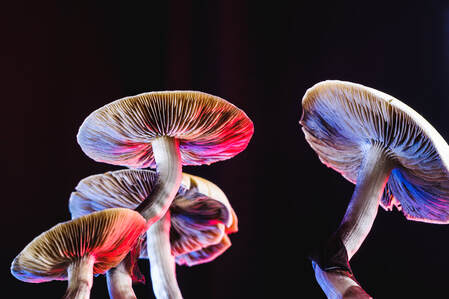|
By Jianna Martinez For many people with depression, standard antidepressants have become the only viable treatment option. However, antidepressants are not always effective at treating depression, especially in the long-term. A study by Northwestern University reported that more than half of people on antidepressants, here being SSRI’S, don’t get the relief they need, with 33% experiencing a return of depressive symptoms after taking this medication for a long time. The study highlighted that developers of standard depressants believed that depression is caused by stress or trauma. Therefore, the medication was developed to target aspects of the brain affected by stress or trauma instead of targeting the underlying source of depression among neurons. This dissatisfying solution has left the question of whether there are other substances that could have more relieving effects than the most commonly used antidepressants today. Psilocybin, a compound in mushrooms, most commonly used recreationally for its psychedelic effects, has been studied for its potential antidepressant properties, despite its classification as an illicit substance. Specifically, one of psilocybin’s compounds called COMP 360, is known to have an ability to bind to parts of the brain that are affected by depression. COMP 360 is classified as a serotonin 2A receptor type, meaning that this compound can bind to these receptors where serotonin would typically be lacking in people with depression. Research has shown that it can also increase integration between different parts of the brain. Since one of the depression’s major effects is to segregate areas of the brain, psilocybin might present a better long-term solution to depression than antidepressants such as SSRI’s. In studies that have given patients a two-dose treatment of 25 milligrams of psilocybin and followed up with them for up to 12 months after the initial treatment, 75% of the patients reported a continued antidepressant response. These patients had previously taken antidepressants, which required continual, repeated intake that failed to produce immediate effects, contrasting psilocybin’s potential effects. Because of psilocybin’s ability to facilitate integration among the brain, it has also reportedly been effective at treating other disorders such as anxiety, PTSD and addiction. Psilocybin’s potential to act as an antidepressant has been studied significantly; however, as research is still relatively new, certain aspects are still unknown, preventing its widespread use as of now. Trials are still underway, alongside other drugs, such as ketamine and MDMA, to study their potential in serving as antidepressants. Despite the controversies that might arise as a result of the rising use of illicit drugs as antidepressants, it is important to note that these substances can present new possibilities for improvement when moderately and safely used. Although hesitation of use is legitimate with drugs such as those that are known to be recreationally abused, challenging the notion that these substances are solely harmful is important in maximizing opportunities for those who have yet to find success among substances that are, on the other hand, socially accepted and widely accessible.
0 Comments
Leave a Reply. |
Categories
All
Archives
April 2024
|



